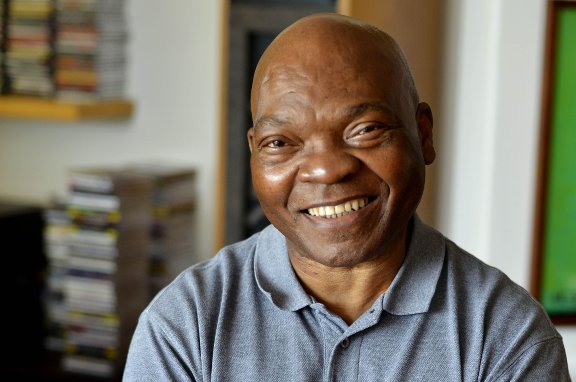How Mandla Langa made Mandela 'sing through his own words'
In Dare not linger, South African writer Mandla Langa, recalls Nelson Mandela's presidency based on the 70.000 words the ANC-leader left in the archives of his foundation. It took Langa less than a year to produce a vivid account of South Africa's transformation from dictatorship into democracy. 'Of course Mandela made mistakes, and he was the first to acknowledge these. But today the country's leadership projects its own failures on Mandela.' ZAM spoke to Mandla who was in Amsterdam for the launch of the Dutch translation of his book.
How did Mandla meet Mandela?
Our relationship started in the early nineties. I was working at the ANC office in London. I edited a book by South African writers and asked Mandela to write a preface. He agreed and asked me to ghost write. When he came to London he signed my text. Meeting him in flesh and blood showed a completely different man. He was far more dignified and visionary than I had thought. Under his presidency from 1994, I worked for government communications.
It has been 18 years since Mandela stepped down. Why took it so long for this book to come out?
He already started writing when he was president. Notes about the hurdles he came across, the pitfalls or even mistakes he might have made, the people he met, the trips abroad – reflections. But over time he became too busy and his health deteriorated. Ultimately he could not finish it and the notes ended up in the family archives at the Nelson Mandela Foundation in Johannesburg. When his widow Graça Machel suggested that something had to be done with those 70 000 words, I was selected to take up that job.
You are a fiction writer.
Yes, but I have always been involved in archival work. And I have written a number of novels dealing with power, turbulence and intrigue. I felt intimidated at first because Mandela is not an ordinary person. But eventually I saw the challenge in making Mandela sing through his own words. And then his memories had also to be turned into a tellable story. The stock-in-trade of a novelist is to find an entry point and move with that.
Did your views on Mandela change as you were working on the notes?
I got to know a person who sometimes became very frustrated. Transforming a society often seemed so much more difficult than fighting an evil system. He also got frustrated with some of the people he worked with. Former Apartheid President de Klerk (Deputy President in a Government of National Unity under Mandela, MH) for instance. But he also felt that De Klerk represented a constituency and that he should be careful not to humiliate people. In the years before his presidency he showed huge frustration about the massacres, the work of Apartheid intelligence, the security forces and the Inkatha Freedom Party.
I also saw anger in his notes. He would lash out when the idea of democracy was threatened. At the other hand, his patience with some of the personalities in power in other African countries surprised me. But because of this patience he managed to get Khadaffi agree to accept the UN roadmap in resolving the Lockerbie crisis.
Some people argue that President Mandela was just a figure head. But your book suggests the opposite. Where does this perception come from?
No leader escapes misinterpretation. When a person becomes larger than life, when there seems to be a certain effortlessness about the way he achieves things, there will always be people who will say he or she was just the right person at the right time, he was the foot soldier who put things together. I am pretty sure that my recollection in the book is accurate. I did not only study Mandela's notes but interviewed many people he worked with, people in his cabinet. He was very hands-on. Sometimes frustratingly so.
Mandela has also been accused of having sold out the interests of black people to please white South Africans.
South Africa is going through very difficult times and we must hold the ANC leadership accountable for that. What they do is to create a bogeyman, a red herring. Let's blame Mandela! Very few leaders have the capacity to say: 'We messed up.' Actually, Mandela did just that after he had proposed that youngsters should have the right to vote from age 14. When criticised for this, Mandela said: 'I have made a mistake.' I think we should be very careful not to judge developments through today's lens. In the beginning of the nineties some concessions were made because the country was on the edge of civil war.
How would you define Mandela's legacy?
He proved South Africans that they can do it. They can achieve. They can break the barriers. They can triumph over insurmountable odds. He created an important example: that however hard an issue, it can be broken down and be dealt with and solved. Right now the world is in trouble. You think South Africa is in trouble? Check what is happening elsewhere. The world is in real, real trouble. And part of the trouble is the fact that there are no leaders that have authority -while not being authoritarian.
Dare not linger was launched in 12 countries. The Dutch translation De presidentiële jaren. Bij de vrijheid begint het pas has been published by AtlasContact.


